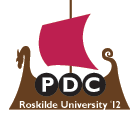| EXPL PAPERS | TUESDAY 14:00-15:00 | SMALL AUDITORIUM |
Health I
Session chair: Sisse Finken, Oslo University
Designing daybuilder: An experimental app to support people with depression
Philip Kaare Løventoft, University of Copenhagen
Lasse Benn Nørregaard, University of Copenhagen
Erik Frøkjær, University of Copenhagen
Abstract. Daybuilder is an experimental smartphone app intended to support people with depression. It was designed in collaboration with six participants who had all received antidepressant medication within the last two years. The Daybuilder prototype was field tested with the same six participants for three to four weeks. All participants were interested in using an application like Daybuilder, immediately or in the future if they were to suffer from depression again. The study has shown it possible to design a smartphone app that people with depression find interesting and potentially supportive in their daily lives and in their clinical treatment. In this project we chose to work directly with the depressive people, without involving clinicians, in an effort to get as close as possible to the participants’ needs and concerns. This approach caused certain difficulties in recruitment, required adaptation of design activities, and consideration of certain ethical issues. The seriousness and prevalence of depression in society make it urgent as a next step to do a comprehensive study to clarify possible clinical effects of using smartphone apps for this special user group.
Participants' interpretations of PD workshop results
Julia Garde, University of Twente
Maascha van der Voort, University of Twente
Abstract. While the majority of participatory design (PD) research deals with the development of tools and the analysis of occurrences during workshops, we believe more research into the meaning and value of PD study results is needed to make PD more attractive to design practice. In this paper we present how forty participants of an ongoing one-year healthcare project interpret the outcomes of participatory design sessions with varying topics differently and what can be learned from that. We find that different workshop topics and different roles in the project lead to significant differences in how workshop outcomes are interpreted by individual participants, project managers, and researchers. These results illustrate the value of an inventory of the interpretations of individual participants of workshops results so that we are able to dynamically adjust successive sessions to match these perspectives and hence improve the success of the whole PD study.
Challenges of participatory design for social innovation: A case study in aging society
Akihiko Obata, Fujitso Laboratories Ltd
Kataro Ohori, Fujitso Laboratories Ltd
Noriyuki Kobayashi, Fujitsu Laboratories Ltd
Henrik Hochreuter, University of Copenhagen
Finn Kensing, University of Copenhagen
Abstract. The purpose of the paper is to further our understanding of conditions for participatory design (PD). We base our reflections on an ongoing project to develop new ICT concepts for social innovation to mitigate consequences of the aging society as faced by a Japanese city. MUST was chosen since it is a PD method that has been successfully applied in commercial contexts in the US and in Scandinavia. However, we found that social innovation is a complex new territory for PD, both as to project management issues and in terms of conditions for applying tools and techniques for participatory analysis and design. Especially, we found that identifying and adequately engaging stakeholders to be problematic. The diverse set of user groups, potential customers, and IT-developers could not all be defined at the start. This calls for a different type of iteration than the MUST method suggests. Further, the method presumes the involved stakeholders to be able to spend more time in the project than the stakeholders in this project could commit to.
